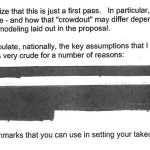Is RI’s Ruling Class Capable of Learning the Lesson?
A story from yesterday and a story from today, both in the Providence Journal, raise the question of whether the people who operate Rhode Island’s government are capable of learning the lesson of our state’s predicament. (That they apparently haven’t learned it yet comes pretty close to answering the question.)
Let’s start with Randal Edgar’s story today:
Taking stances that could complicate the challenges facing lawmakers and Governor-elect Gina Raimondo, the Department of Children, Youth and Families, the Department of Human Services and the Judiciary are among the departments and agencies that say they can’t cut their way to a balanced budget.
Instead, they are seeking more money, or suggesting that some of their costs be assigned elsewhere.
The recurring theme is that the departments say they can’t make the necessary budget reductions without cutting into their staffing or programs, to which I say, “Well, yeah.” They’re going to have to cut. Government can’t be the one sector, in Rhode Island, that’s recession proof (or even societal-decline proof). Agencies are going to have to do less with fewer people. Sorry.
HealthSource RI is an excellent example of the problem. Reading Edgar’s article, it’s clear that implementing the ObamaCare health benefits exchange and the related expansion of Medicaid were terrible decisions. Like somebody addicted to gambling or credit cards, Rhode Island government has long been counting on a recovery that’s never going to come.
The good news is that the department heads’ complaint that cuts would be draconian are blowing smoke. Look to the RI Center for Freedom & Prosperity’s Spotlight on Spending report for tips on how a few tens of millions of dollars could be found easily.
For another example of why the cuts must be made, turn to Paul Edward Parker’s article about T.F. Green Airport, yesterday. Be sure to read to the end:
At the end of the day, though, there’s only so much [Rhode Island Airport Corporation President Kelly Fredericks] can do to boost passenger levels at Green. He needs sharp marketing, and plans to extend the main runway will help. But two more significant factors will remain beyond his control:
How will Rhode Island’s economy fare?
Will airlines change strategy to put more emphasis on secondary airports?
This isn’t complicated. If more people are doing business year round in Rhode Island, airlines will have incentive to increase direct flights, including from distant locations.
Every one of these stories related to the local economy in recent years has the same moral: Government must loosen its tax and regulatory grip on the Rhode Island economy so that we, Rhode Islanders, can find the best ways to put our talents and resources to use. When we’re thriving, the government can start to think about expanding again, but until that point, it ought to be in a hurry to get out of our way.


